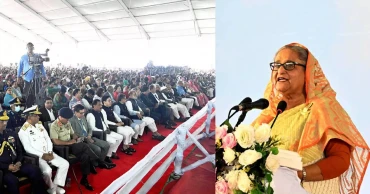progress
‘We keep our promises one by one’: PM Hasina says at launch of underground metro construction work
Prime Minister Sheikh Hasina today launched the construction of Bangladesh’s first underground metro rail – hailing it as yet another milestone in the country’s journey towards progress under her leadership.
“We are launching the construction work of underground metro rail. With this, another milestone has been achieved in Bangladesh’s development journey,” she said.
The PM was addressing a civic rally arranged at Purbachal, on the outskirts of Dhaka city, to mark the inauguration of Mass Rapid Transit Line-1 (MRT-1) – country’s first underground metro project – construction work.
She launched the construction work of the 31.24 km MRT Line-1, unveiling its inaugural plaque in Rupganj under Narayanganj.
The MRT Line-1 – having both underground and elevated facilities – will be constructed at an estimated cost of Tk 52,561.43 crore by 2026.
Sheikh Hasina said Bangladesh is progressing at an indomitable speed as per the slogan “Bangladesh on the march towards prosperity” – announced in her party’s 2018 election manifesto.
“We keep our promises one by one,” she said, adding that her government implemented the Vision-2021 as well as metro rail to ease traffic congestion as per its commitment announced before the 2008 national election.
“If Awami League makes a promise, it keeps it,” she said.
AL gets votes, winning hearts of the people through work, she said.
Sheikh Hasina, also the Awami League president, said the BNP-Jamaat alliance secured only 30 seats out of 300 in the 2008 parliamentary election.
“We have ensured people’s wellbeing. So, they are are voting for us. We have earned the trust and confidence of the people. We are getting votes, winning the hearts of people through our work,” she added.
Referring to Wednesday’s by-elections, she said the ‘boat’ – electoral symbol of Awami League – won in by-polls in Bogura and Chapainawabganj.
Also read: PM opens construction work of country's first-ever underground metro rail
The AL chief extended sincere thanks to those who voted for the ‘boat’.
The first underground metro line will have two parts – a 19.87 km part from Hazrat Shahjalal International Airport to Kamalapur (Airport route) and an around 11.37 km elevated line from Natun Bazar to Purbachal (Purbachal route).
The airport route includes 16.4 km underground with 12 stations, while the Purbachal route includes seven stations.
To implement the MRT Line-1, Japan International Cooperation (JICA) will finance Tk 39,450.32 crore, while the rest Tk 13,111.11 crore will be drawn from the government’s fund.
Some eight lakh passengers will be able to travel through the MRT Line-1 every day. It will take commuters only 25 minutes to travel from Dhaka airport to Kamalapur with breaks at 12 underground stations and 21 minutes from Natunbazar to Purbachal with breaks at seven stations.
Besides, commuters will be able to reach Purbachal from Kamalapur with an interchange in Natunbazar station within only 40 minutes with breaks at 16 stations.
A total of six metro rail routes will be inaugurated in the capital city Dhaka by 2030.
The Executive Committee of the National Economic Council (Ecnec) approved the MRT line-1 project at Tk 52,561.43 crore in 2019.
On December 28 last year the prime minister opened the operation of the country’s first metro rail service on the Uttara-Agargaon part of MRT Line-6 (Uttara-Agargaon-Farmgate-TSC-Motijheel-Kamalapur). The work of MRT-6 line till Motijheel will be completed by December 2023 and will be extended to Kamalapur by June 2025.
The construction work of MRT-5 (northern route) will be inaugurated in July 2023. MRT-5 (northern route) line will be from Savar’s Hemayetpur to Bhatara via Gabtoli, Mirpur and Gulshan.
Road Transport and Bridges Minister Obaidul Quader presided over the event, while Textiles and Jute Minister and local MP Golam Dastagir Gazi, Japanese Ambassador to Bangladesh Iwama Kiminori, Secretary of Road Transport and Highways Division ABM Amin Ullah Nuri, Managing Director of Dhaka Mass Transit Company Limited (DMTCL) MAN Siddique and Chief Representative of JICA Bangladesh Ichiguchi Tomohide spoke on the occasion. Narayanganj City Corporation Mayor Selina Hayat Ivy, Bagerhat-1 MP Sk Helal Uddin, Narayanganj MPs Shamim Osman, AKM Salim Osman, Nazrul Islam Babu and Leakat Hossain Khoka were also present at the event.
3 years ago
Bangladesh makes huge progress in last 20 years: UK
British High Commission Dhaka’s Development Director Matt Cannell has said the government of Bangladesh has made huge development over the last twenty years.
“The UK has a strong and vibrant partnership with the government of Bangladesh in a range of areas, including diplomacy, trade and development,” Cannell said.
He said they are increasing their work to help end preventable deaths of mothers and newborn children in 11 countries around the world, including here in Bangladesh.
“I would like to particularly applaud the work of newly trained midwives in improving maternal and newborn health care,” Cannell said.
Head of Human Development Department of the Foreign, Commonwealth and Development Office in the UK Chris Carter said Bangladesh is rightly applauded for its family planning and immunization programmes, and the government’s commitment to driving down maternal and child deaths, such as the Bangladesh Every Newborn Action Plan.
“We hope to do more to help build on these efforts. It has been incredible to see the beginning of another Bangladesh success story to develop a new icddr.b alternative formula for Ready-to-use Therapeutic Food (RUTF),” Carter said.
The British High Commission Dhaka recently co-hosted a roundtable with the government of Bangladesh and other development partners to discuss how to step up efforts to end preventable deaths of mothers, babies and children in Bangladesh.
Director General of Directorate General of Health Services (DGHS) Prof. Dr. Abul Bashar Mohammed Khurshid Alam attended the roundtable as the chief guest.
Chris Carter set out how the UK plans to work closely with the government and partners to sustain and build on Bangladesh’s progress on ending preventable deaths.
This includes working on quality, affordable health services and also addressing underlying issues, such as poor nutrition.
The roundtable included an initial consultation about how to tackle the remaining issues that cause preventable deaths of mothers, babies and children in Bangladesh.
This will help to inform the UK’s approach and identify areas where the UK, the government of Bangladesh and other partners can intensify their collaboration, said the British High Commission in Dhaka on Sunday.
3 years ago
Bangladesh Poverty Watch Report 2022 launched; regular monitoring of progress emphasized
Regular monitoring of progress is important to assess the degree of convergence between the left behind and the relatively advanced population groups and the lagging and the well-off regions of Bangladesh, says the Bangladesh Poverty Watch Report 2022 on Saturday (January 21, 2023).
The report, jointly prepared by Institute for Inclusive Finance and Development (InM) and Center for Inclusive Development Dialogue (CIDD), aimed to ensure that grassroots voices of ‘left behind’ and extremely poor population groups are heard and these are reflected in policies.
Chairman, CIDD Dr. Mustafa K. Mujeri and Chairman InM Dr. Qazi Kholiquzzaman Ahmad, among others, spoke at the launching event for the Bangladesh Poverty Watch Report 2022.
The Poverty Watch Report 2022 summarised some current aspects of poverty including testimonies, reflections and ‘stories’ of individuals from selected ‘left behind’ population groups belonging to seven plain land ethnic minority groups (Santal, Mal Paharia, Garo, Hajong, Mandi, Oraon and Munda) and the transgender community.
Also read: Poverty forces Thakurgaon day-labourer to put 7-month-old baby girl up for sale
In their ‘stories’, the participants shared their experience of having found themselves in poverty, exclusion and extremely difficult conditions reinforced by systemic errors and structural inequalities.
The Report suggests several priority actions for speeding up their catching up process in society.
The key will be to craft these policies/actions within the broader inclusive development strategies of the government that cover cross-cutting and national level issues, such as strengthening inclusive growth, ensuring financial inclusion, reducing income and social inequality, accessing quality education, health, nutrition and other basic services, adopting appropriate macroeconomic policy, addressing pockets of lagging social groups/regions, and adopting initiatives at the local level along with effectively managing micro-macro transmissions, according to the report.
These left-behind communities have issues that are directly or indirectly related to the daily work of the local governments and local institutions, said the report.
Also read: EU to provide €23 million to PKSF for extreme poverty reduction
For implementing the agenda, one important element will be to utilise the potential of local action to drive development and create appropriate legal and financial frameworks to support all local partners in playing their part in the achievement of the integrated and universal inclusion agenda.
The key is to empower all local stakeholders, especially the local government institutions, aimed at making sustainable and inclusive development more responsive, and therefore, relevant to local needs and aspirations.
The goals will be reached only if local actors including these left-behind communities fully participate, not only in the implementation, but also in the agenda-setting and monitoring processes.
Participation requires that all relevant actors are involved in the decision-making process, through consultative and participative mechanisms, at the local and national levels within the overall inclusion framework, according to the report.
Read More: Colombia seeks Yunus' advice on poverty reduction, 'total peace'
3 years ago
Rab made ‘tremendous progress’ in ‘respecting rights’ while performing duties: Donald Lu observes
Assistant Secretary of State for the Bureau of South and Central Asian Affairs Donald Lu has appreciated the “tremendous progress” made by Rab in “respecting human rights” while performing its duties.
“We had quite a good discussion about the Rab. If you have seen the statement this week by the Human Rights Watch, they recognised and we recognised tremendous progress in the area of reducing extra judicial killings by the Rab,” he told reporters at the Ministry of Foreign Affairs today.
“This is amazing work. It shows the Rab is able to carry out its important counterterrorism and law enforcement function while respecting human rights,” Lu added.
Foreign Minister Dr AK Abdul Momen and Foreign Secretary Masud Bin Momen also spoke on the occasion.
The senior US official said they had “very honest and open” discussions with the Bangladesh foreign minister and foreign secretary.
“We have expressed our commitment to democracy and human rights. We will speak when we see problems and when we can offer suggestions. We will stand up for freedom of speech, freedom of expression. And we look forward to working very closely with our partners here in Bangladesh,” Lu said.
Regarding the labour rights issue, he said it is important for Bangladesh and for trade relationships.
“I had the honour of sitting down this morning with (PM’s adviser) Salman F Raman to talk about the way forward, so that we can cooperate on improvement of labour rights in this country. I’m very confident we’re going to make progress this year,” said the US official.
INDO-PACIFIC STRATEGY
Asked whether the US wants Bangladesh to join the Indo-Pacific Strategy, Lu said they had a “wonderful discussion” on the Indo-Pacific Strategy. “It’s a strategy, it’s not a club. We don’t join.”
Regarding restoration of GSP (generalised system of preferences) facilities for Bangladesh, the US official said they are still waiting for the Congress to authorise GSP for any country.
“We are working very closely with the government of Bangladesh,” Lu said, adding that Bangladesh will be the first country on the list if the Congress authorises.
“I am here to strengthen the friendship with Bangladesh when the world is struggling to establish peace and justice,” he said before taking questions.
Talking to reporters, Foreign Minister Momen said, “I am very happy. We had very constructive discussions. The US is our old friend and our relationship turned deeper over the last 50 years. We want to make the relationship much deeper in the next 50 years.”
Momen said the US side invited them to visit this month or in April. “This engagement is very effective.”
Foreign Secretary Masud Bin Momen said they discussed all issues of mutual interest – trade, investment, labour rights, sanctions, human rights, democracy and development, as well as Bangladesh’s views on the Indo-Pacific.
“Through our sincere efforts, we will be able to elevate our relations to a higher level,” said the foreign secretary.
Read more: US committed to continued cooperation with Bangladesh to improve labor rights: Donald Lu
LABOUR RIGHTS
The United States is “committed” to continued cooperation with Bangladesh in its efforts to improve labour rights, Lu said.
At a meeting with Bangladeshi labour rights leaders, Lu listened to their experiences and concerns.
Earlier in the morning, he had a breakfast meeting with Prime Minister’s Private Industry and Investment Adviser Salman F Rahman.
The US Assistant Secretary had a meeting over dinner with Foreign Minister Momen at his residence on Saturday night.
Key issues of bilateral relations were discussed during Lu’s over one-hour stay at the foreign minister’s official residence, a diplomatic source told UNB.
Lu, who arrived in Dhaka on Saturday evening, directly went to the foreign minister’s residence accompanied by US Ambassador to Bangladesh, Peter Haas.
The US senior official is visiting Bangladesh to discuss ways to strengthen bilateral relationship, expand economic engagement, and go over the labour and human rights situation.
3 years ago
IMF acknowledges Bangladesh’s outstanding socioeconomic progress: Finance Minister
Finance Minister AHM Mustafa Kamal On Saturday said the International Monetary Fund (IMF) in 'an open mind acknowledged' the outstanding achievements of Bangladesh in socio-economic progress.
Kamal said this while speaking as the chief guest at the National VAT Day event, held in a hotel in the capital. Chairman of the National Board of Revenue (NBR) Abu Rahmatul Muneem presided over the function.
Read more: Finance Minister Mustafa Kamal urges global leaders to ease economic crisis
“The success of Bangladesh is not the only achievement of the government. This achievement has been possible with the involvement of the people of this country, so we owe it to the taxpayers,” Kamal said.
Jasimuddin, president of FBCCI, complained that a businessman had paid Tk 1.0 crore as VAT last year. This year he will have to pay Tk1.0 crore VAT - the VAT officials put him under such pressure.
“If the business is bad this year, why should the businessman pay Tk1.0 crore of VAT?” The FBCCI president urged not to harass those who pay VAT regularly and not to create a situation of panic.
Read more: Mustafa Kamal dismisses reports about Bangladesh request for IMF loan
NBR members, senior tax officials, and business leaders were also present at the function.
3 years ago
Metrol rail project sees 63.2 pc progress: Quader
Road Transport and Bridges Minister Obaidul Quader on Tuesday said the average progress of the construction work of the first metro rail in Bangladesh is 63.2 percent.
He made the remarks while talking to reports after visiting the first metro rail set and progress of the project work at the Uttara depot.
Read:Metro train coaches being moved to depot: Quader
Obaidul Quader joined the programme virtually from his official residence.
He said the progress of the construction work from Uttara to Agargaon section scheduled to be completed in the first phase is 84.9 percent.
He further said that the progress of the construction work from Agargaon to Motijheel section scheduled to be implemented in the second phase is 59.7 percent and the overall progress of procurement of electrical and mechanical system, rolling stock and depot equipment is 54.4 percent.
4 years ago











